BIRMINGHAM, Ala. — On a sunny, breezy afternoon Paulette Roby shows visitors the way to Kelly Ingram Park, proudly pointing out Black-owned businesses along the way, including barber shops and restaurants.
The downtown streets are dotted with markers for the Birmingham Civil Rights District – designated aNational Monument by President Obama.
"This is a very sacred place for me," says Roby as she arrives at the park. The site is where students peacefully marched in the Spring of 1963 to demand an end to segregation. It became known as "The Children's Crusade."
Roby chairs theCivil Rights Activist Committee– which has an office in the district that's jam-packed with historic memorabilia. The group documents the stories of the thousands of children known as foot soldiers, including Roby, who participated in the Birmingham movement with the Revs. Martin Luther King, Jr., Fred Shuttlesworth and James Bevel with the Southern Christian Leadership Conference (SCLC).
"They taught us about non-violence," Roby says. "If you wanted to participate in the movement, you had to commit yourself to be a non-violent person."
Birmingham is celebrating a milestone this year – the 60th anniversary of the city's civil rights movement. It marked a turning point when national civil rights leaders looked to youth to join the struggle for equal rights. The brutal response from white segregationists shocked the world, and galvanized support for passage of the Civil Rights Act.
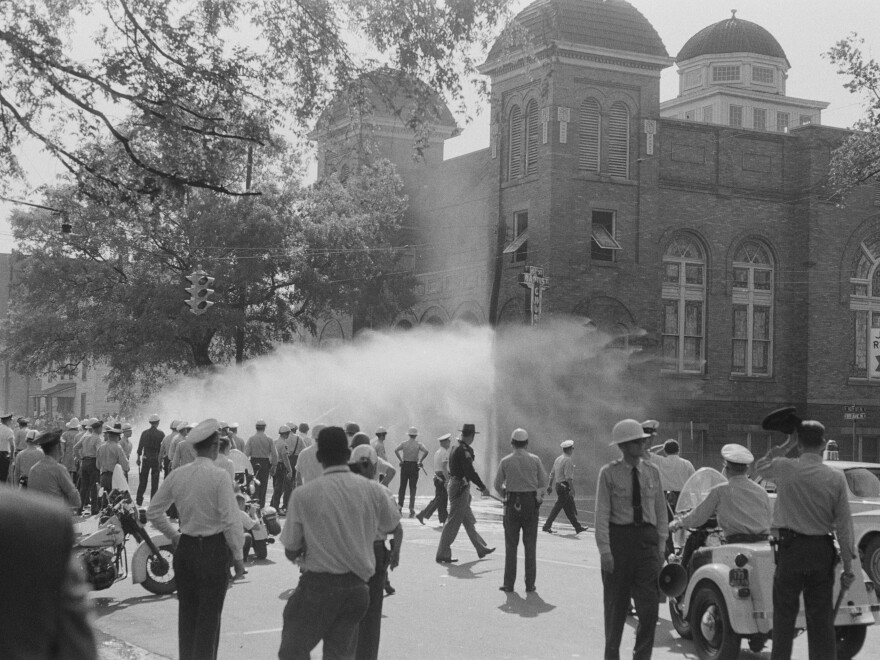
Roby sits on a park bench at Kelly Ingram and points out 16th Street Baptist Churchon the corner. The church was a hub for organizing the protests. Students would gather there, and then march two-by-two into downtown. She says organizers told them to stay on the sidewalks because they didn't have a permit to demonstrate.
But police were waiting – with dogs and firehoses, and yellow school buses turned paddy wagons.
"Several times I had to run to keep from either being arrested or the dogs being let loose on me," says Roby.
Roby, now 73, was 13-years-old at the time and has vivid memories of a nearby magnolia tree.
"I get an eerie feeling when I come around that tree because of the time that they put the water hoses on us," she says. "I remember how Dr. King had us lock our arms so that the pressure of the water hoses would not take us halfway down the street."
Next to the magnolia tree sits a sculpture of three dogs on leashes, mouths wide open, teeth peeled as if ready to pounce on the kids.
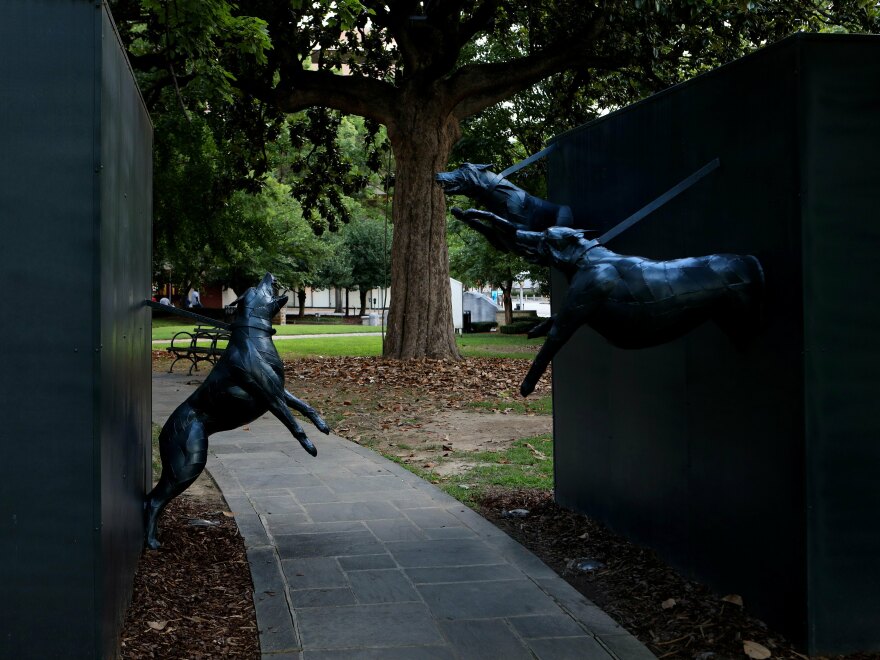
"Sometimes it's just hard for you to talk about it," Roby reflects.
And it was hard for the nation and the world to see the images back in 1963.
Birmingham police commissioner Bull Connor ordered officers to use attack dogs and fire hoses on the young protesters – the scene was pivotal in the civil rights movement. The images sparked outrage, and drew new attention to the struggle to end Jim Crow laws that relegated Black people to second-class citizenship.
A breakthrough in 'Bombingham'
National civil rights leaders had deliberately brought the fight to Birmingham where the Rev. Shuttlesworth and other local activists had met fierce resistance trying to desegregate schools, buses and retail businesses. There were beatings and bombings – so many that the city was known as "Bombingham."
"If we can get a breakthrough in Birmingham and really break down the walls of segregation, it will demonstrate to the whole south, at least the hard-core south, that it can no longer resist," King said in explaining the strategy at the time.
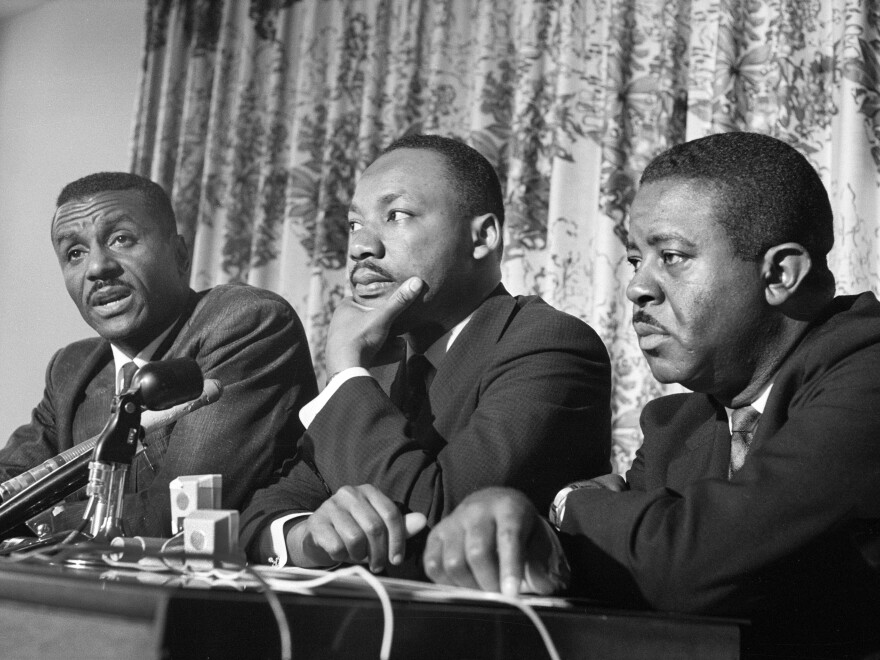
That breakthrough came a year later with passage of the Civil Rights Act that outlawed racial discrimination in public accommodations.
That's something worth celebrating today according to Birmingham Mayor Randall Woodfin.
"Although there was resistance to change, this 1963 campaign actually won," he says. "I think that's what people need to remember."
Woodfin, an African-American leader who says he takes inspiration from Shuttlesworth's tenacity, says the Birmingham movement changed the country.
"In commemorating 60 years later, there's an opportunity to say, here is the blueprint on how to affect change," says Woodfin. "Here's the strategy of how it got done and won."
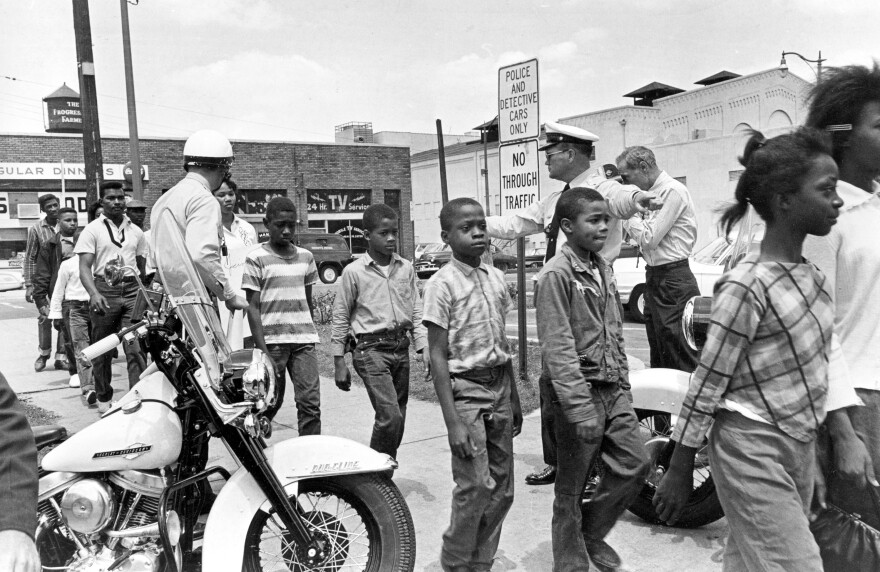
Foot soldier Terry Collins says the Birmingham of his youth was in constant turmoil.
"We were in a state of siege," he says.
Collins describes it as a teapot boiling over so much that children and teens were willing to rise up in ways that their parents could not afford.
"People had economic concerns and the children were not subject to that," Collins says. "They didn't have to be concerned about their careers being ruined and all that. We had nothing to lose. Well, our lives. But our lives were terrible anyway."

Collins, a retired civil servant, was 15 during the Children's Crusade. His 13-year old brother marched alongside him. Fear and intimidation were ever present in their daily lives.
"You could not go through a white community without possibly being chased or being stopped by the police or being harassed by the residents," he says.
Collins recalls the meticulous organization behind the Children's Crusade, including classes teaching them how to avoid retaliation when faced with force. If you couldn't refrain from responding, he says, they would find another role for you behind the scenes – perhaps making signs, or helping with food and water.
Not afraid of your jail
The demonstrators would divide into groups and depart from different directions to multiple destinations, trying to outmaneuver police with so many fronts. Collins was involved in lunch counter sit-ins at local department stores. He says they were always prepared to face attacks and even jail.
"Normally people run away from being arrested. But we ran to it," says Collins. "The threat of jailing us? So what? We were already in jail, even in our neighborhoods. There was just no fence."
After months of mass meetings and training, the foot soldiers got their cue that it was time to deploy from local radio.
"There was a signal that was going to go out across the airways and that was 'Good Googly Woogly,'" he recalls. "That day we would walk out of school and all converge downtown."
Leaders had enlisted a well-liked Black DJ, Shelley "The Playboy" Stewart who kept children informed while playing popular music.

"I marched on May 2nd, 1963. It was a Thursday, and I remember it like yesterday," says Janice Wesley Kelsey, who was 16 then.
"I woke up that morning with my mind on freedom. I was so excited."
She too was tuned into DJ Shelley Stewart on WENN-AM for instructions, all in code.
"He was saying, 'we're going to have a party in the park.' I knew what that meant - Kelly Ingram Park," remembers Kelsey sitting in the family room of her Birmingham home.
"'We're going to jump and shout. We're going to turn it out.' I knew what that meant - we were going to school, but we weren't going to stay."
On his show, the DJ used another code to remind children to be prepared for jail: "Bring your toothbrushes because lunch will be served."
Kelsey slipped a toothbrush and a change of underwear in her purse – she was ready.
She says participating in the Children's Crusade was eye-opening for her. She attended a series of classes led by Bevel – a key architect of the Birmingham movement. He taught the teens to question a system that left Black students with the outdated hand-me-downs from all-white schools and prevented them from eating at the drugstore lunch counter.
"That was my first indication that something was wrong," says Kelsey. "I knew about segregation, but my thought was it's just separation. I didn't get the idea of inequality until we went through this series."
Kelsey was arrested, and held for four days after participating in the Children's Crusade.
Freedom songs got them over
"We marched out in pairs singing 'We Shall Overcome.' We did not get very far before a police officer stopped us," Kelsey remembers.
She says she always had a feeling she would land in jail, but the experience was still traumatic. "I was intimidated by looking at a white man, a police officer, gun on his hip, stick in his hand." says Kelsey. "But somebody started singing, 'We are Not Afraid.' That gave me the courage to remain in that line and to be arrested."
Back in Kelly Ingram Park, Paulette Roby says faith and music were pillars of strength and kept the foot soldiers pressing forward.
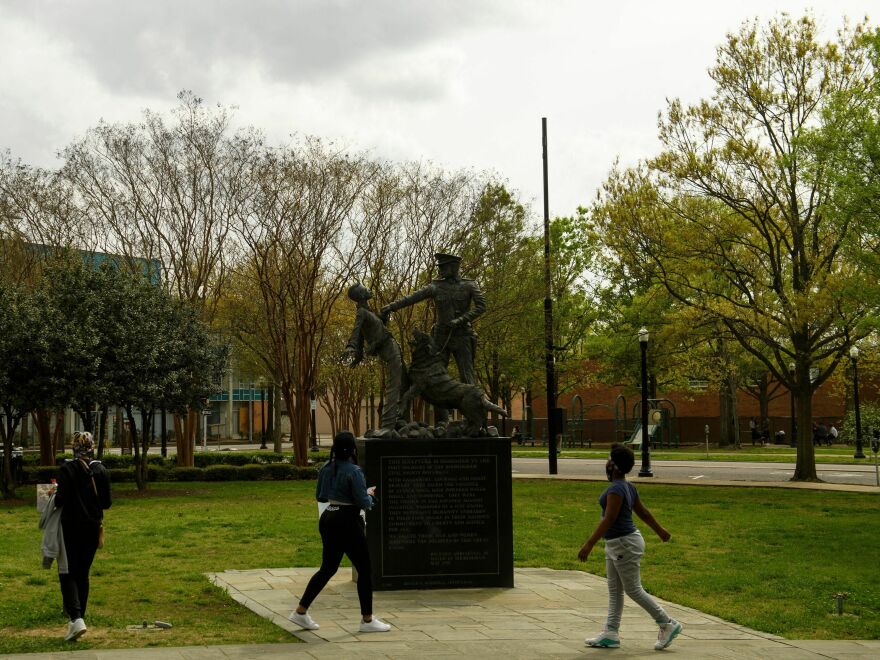
"Those songs - those freedom songs - they really, really, really did a lot for me and got me over," she says. Ask about any favorites, she begins singing, "I woke up this morning with my mind set on freedom. I woke up this morning with my mind set on freedom. Hallelu. Hallelu. Hallelujah."
Without skipping a beat, she adds, "along with 'We Shall Overcome.' That song makes chills go all over my body. So it has to be something that was about this song that got in my soul."
As Birmingham marks the 60th anniversary of the fight to end segregation these activists are proud of their historical role and reflect on the takeaway in today's climate.
The struggle, will it ever end?
For Janice Kelsey, talking about what happened in 1963 didn't come easily. She was silent about it for decades, finding it too painful to dissect. The violence against activists continued that year – leading up to the Ku Klux Klan's bombing of 16th Street Baptist Church in September that killed four Black girls as they were getting ready for Youth Sunday. Kelsey says unless their stories are told, the legacy of the Birmingham movement could be in jeopardy.
"It concerns me that some people in leadership positions like governors and some legislators are trying to turn back the hands of time." she says. "They are putting legislation forward that would say we should not study Black history and this is a part of American history and it should not be shut out."
Despite the pain and trauma, Kelsey says future generations need to understand their freedoms are the result of great sacrifice.
Paulette Roby says she knows they made a difference and won hard-fought change, but says the fight for equal rights isn't over.
She wonders "the struggle - will it ever end?"
Copyright 2023 NPR. To see more, visit https://www.npr.org.





